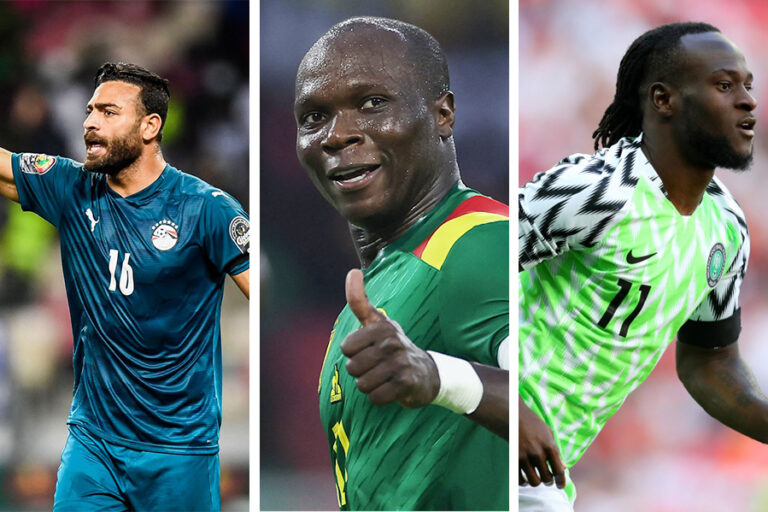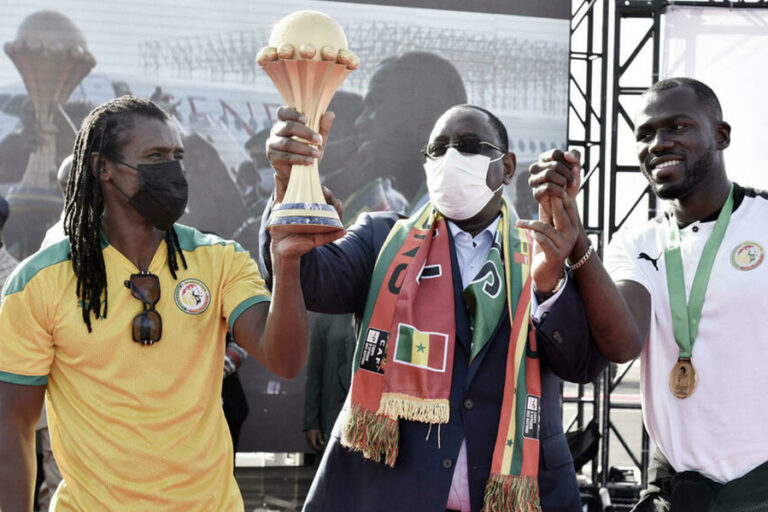Egyptian goalkeeper, Gabaski has been named in the Best XI for the 2021 Africa Cup of Nations (AFCON) team of the tournament.
Gabaski, alongside Senegal’s Sadio Mane, Cameroon’s Vincent Aboubakar, Nigeria’s Sadio Mane, was named in the Best XI following the conclusion of the 2021 AFCON tournament on Sunday night.
Recall that Senegal defeated Egypt 4-2 in a penalty shootout to win the 2021 AFCON for the first time in their country’s history.
In a 4-4-2 formation, the football statistics website, Whoscored, published the Best XI for AFCON team of the tournament and Simon is deployed as an attacking midfielder with Morocco’s Sofiane Boufal (SCO Angers) and Ivory Coast stars, Ibrahim Sangaré (PSV Eindhoven) and Nicolas Pepe (Arsenal) completing the midfield four.
Gabaski (Egypt/Zamalek) starts in goal and the back four contains Achraf Hakimi (Morocco/PSG), Kalidou Koulibaly (Senegal/Napoli), Abdou Diallo (Senegal/PSG) and Saliou Ciss (Senegal/Nancy).
Sadio Mane (Senegal/Liverpool) and Vincent Aboubakar (Cameroon/Al-Nassr) are the two strikers upfront.
Egypt’s Gabaski, Cameroon’s Aboubaker Nigeria’s Moses named in Best XI
Senegal’s football team members offered cash prizes and plots of land
The President of Senegal, Macky Sall, has awarded cash prizes and plots of land to members of the national team after last weekend’s victory over Egypt in the African Cup of Nations.
The Senegalese beat Egypt 4 – 2 on penalties to become Africa’s football champions for the first time.
Speaking at a ceremony in Dakar, President Macky Sall, reaffirmed the pride the team had brought to the country.
“We dreamed of the cup, you built this dream and you made it come true. Finally, the Africa Cup of Nations is here with us. You have made us proud by making the name of Senegal resound all around the world. You have honoured the nation, and in return, the nation you are so proud of owes you honours”, said the president during a speech.
The team’s captain spoke movingly about the meaning of this victory.
“From now on, where our hearts were — we now have a map of Senegal, a people, a goal, a faith and of course a star (on the jersey after winning AFCON), the Africa champions star. ‘We can be killed but not dishonoured,’ that was our slogan throughout the competition”, said team captain, Kalidou Koulibaly.
Senegal has narrowly lost twice before in the AFCON final, in 2019 and 2002.
Relegation threatened Sebeta named Fikru Tefera Technical Director
Following the suspension of two of Zelalem Shiferaw’s assistant’s Sebeta Ketema appointed former Ethiopian international Fikru Tefera Technical Director of the club. Relegation threatened Sebeta dwells second from bottom of the league table with seven points from nine matches.
The giant striker famous for wandering throughout Asian Football had had a number of brief spells to clubs in South Africa, Czech Republic, Finland, Bangladesh, Vietnam, Malaysia and India takes to reigns at Sebeta shouldering a huge burden of helping the side to survive at the top tier.
Fikru’s duty is to work closely with Head Coach Zelalem Shiferaw to add technical input and directions into the squad’s performance in order to steer the club out of relegation and focus on youth development.
One win, four draws and four defeats to sit second from bottom with seven points Sebeta’s prospect of preserving their top flight status look bleak thus the club officials took serious measures on Tuesday suspending long serving assistant Berhan Debele and instructor Daniel G/Mariam. Thus the appointment of Fikru just days before the league season resumes after three weeks suspension called for mixed filings from football fans.
Some believe it is the right time to call a hand with Fikru’s caliber for the team is in danger of relegation. On the other hand others suggest the move is just one step behind sacking Zelalem who took over the team five months earlier.
It is recalled Zelalem signed more than a dozen players including seven much suspended Dawit Estifanos and national midfielder Mesoud Mohammed at the start of the new season.
Water producers halt production
About 20 bottled water producers have stopped their production as a result of shortage and price hike of materials according to information Capital has obtained from the Ethiopian Bottled Water and Soft Drinks Manufacturing Industries Association (EBWSDMIA).
“Purified water bottling businesses are going down,” said Ashenafi Merid, General Manager of EBWSDMIA. Due to the shortage and price hike of raw materials, bottlers are struggling to stay in the market. 20 bottlers have so far stopped their production while the rest operational producers are working under their capacity.
Currently, there are 106 water bottling companies in Ethiopia of which the majority are located in Oromia Region close to Addis Ababa where they can access the biggest number of consumers in the country. All together the water bottling factories produce close to 3.5 billion bottles of water per year.
The price of raw materials in one year has increased by more than double from 53 birr per KG to 130 birr.
“If situations continue their will be shortage of bottle water even in the capital,” opined experts whilst calling on the government to control raw material importers.
“Due to the restriction of trade computation and consumer protection authority, bottlers are not increasing prices; however there is price increase in the market. We have been requesting Addis Ababa Trade and Industry Bureau to control the market,” explained sector experts.
To support the producers, the association taking certain measures including talking with responsible government offices in different issues and as Ashenafi states, perhaps getting answers is a bit difficult for the association.
“Even adjusting the time on transport ban could have effect to the producers,”Ashenafi explained.
“Also regarding, excise tax, which has been a bit of a challenge for producers, we have conducted and submitted our study to the Ministry of Finance to adjust the rate on water producers. Also there are differences in regions regarding the payment of excise tax rate. We have submitted our letter to the Ministry of Revenue to strictly follow the situation,” elaborates Ashenafi.
Beverage companies are also gearing up to downsize their workforces at existing plants in light of the problems they are facing.
“As an option, the association is working to support producers to minimize their cost,” said Ashenafi, highlighting that even though they are trying to combat the issue, government offices are not showing similar cooperation.






